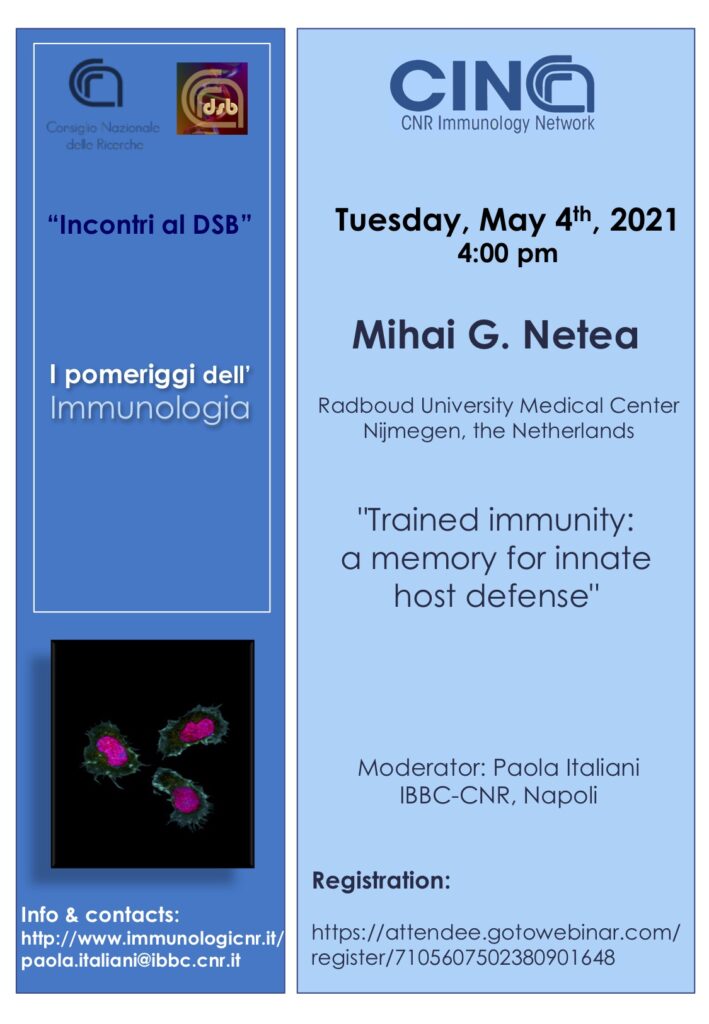Prof. Mihai G. Netea
Radboud University Medical Center, Nijmegen, the Netherlands
Moderator: Paola Italiani
Institute of Biochemistry and Cell Biology – CNR, Naples
Induction of trained immunity (innate immune memory) is mediated by activation of immune and metabolic pathways that result in epigenetic rewiring of cellular functional programs. Chromatin accessibility as assessed by histone modifications at the level of promotors (H3K4me3, H3K27Ac) or enhancers (H3K4me1) is an important mechanism mediating these programs. Through network-level integration of transcriptomics, epigenetics and metabolomics data, Netea’s group identifies glycolysis, glutaminolysis, and the cholesterol synthesis pathway as indispensable for the induction of trained immunity by beta-glucan in monocytes. Accumulation of fumarate, due to glutamine replenishment of the TCA cycle, integrates immune and metabolic circuits to induce monocyte epigenetic reprogramming. Furthermore, fumarate itself induces trained immunity, with induction of an epigenomic program similar to β-glucan-induced trained immunity. Identification of the molecular pathways contributing to induction of trained immunity contributes to our understanding of innate immune memory and opens new therapeutic avenues. Finally, the use of live attenuated vaccines such as BCG can induce beneficial heterologous effects in infections and cancer.

The goal of Prof. Netea’s research efforts is to translate information obtained through the assessment of human genetic variation in patients into novel diagnostic and therapeutic approaches. His group has a strong track record on translating genetic information into understanding pathophysiological mechanisms of disease. He has a broad expertise on the host mechanisms responsible for the recognition of bacterial and fungal pathogens and the activation of the innate immune system, on the one hand, and the genetic susceptibility to infections on the other hand. Prof. Netea has described the epigenetic mechanisms mediating innate immune memory (‘trained immunity’) for the first time, and their role in vaccination, infection, immune-mediated diseases, and cancer.
Mihai Netea is Professor of Experimental Medicine, Head of the Laboratory of Experimental Internal Medicine at the Radboud University in Nijmegen (the Netherlands). Professor of Experimental Medicine, Radboud University Nijmegen Medical Centre, The Netherlands (since 2007). Professor of Immunometabolism, University of Bonn, Germany (since 2017). Professor of Immunology, University of Medicine and Pharmacy Craiova (since 2016).
Scientific Coordinator of the International Trained Immunity Consortium (since 2017) and of the Human Functional Genomics Project (since 2014)
Selected 10 Peer-reviewed Publications
1. Bekkering S, et al. Metabolic Induction of Trained Immunity through the Mevalonate Pathway. Cell. 2018; 172:135-146
2. Mitroulis I, et al. Modulation of Myelopoiesis Progenitors Is an Integral Component of Trained Immunity. Cell. 2018; 172:147-161
3. Arts RJW, et al. BCG Vaccination Protects against Experimental Viral Infection in Humans through the Induction of Cytokines Associated with Trained Immunity. Cell Host Microbe 2018; 23:89-100
4. Ter Horst R, et al. Host and Environmental Factors Influencing Individual Human Cytokine Responses. Cell. 2016;167:1111-1124
5. Li Y, et al. A Functional Genomics Approach to Understand Variation in Cytokine Production in Humans. Cell. 2016;167:1099-1110
6. Netea MG, et al. Trained immunity: A program of innate immune memory in health and disease. Science. 2016;352(6284):1098
7. Cheng SC, et al. mTOR/HIF1-mediated aerobic glycolysis as metabolic basis for trained immunity. Science, 2014, 345: 1250684
8. Kleinnijenhuis J, et al. BCG induces NOD2-dependent non-specific protection to reinfection via epigenetic reprogramming of monocytes. Proc. Natl. Acad Sci USA 2012, 17537-42
9. van de Veerdonk FL, et al. STAT1 mutations in autosomal dominant chronic mucocutaneous candidiasis. N Engl J Med. 2011;365(1):54-61 (47)
10. Netea MG, et al. Trained immunity: a memory for innate host defense. Cell Host Microbe. 19;9:355-61
